President Biden’s Secretary of Agriculture Tom Vilsack has repeatedly spoken at the U.S.-China Business Council – a lobbying group that “serves the interests” of Chinese and American companies – even defending a controversial Chinese state-funded project flagged as a “national security risk” by the U.S. intelligence community.
In 2013, Vilsack headlined a U.S.-China Business Council (USCBC) event, “Dinner in Honor of the US-China Strategic & Economic Dialogue.”
Celebrating that relations between the U.S and the Chinese Communist Party have grown “stronger and deeper,” Vilsack also lobbied for the China Garden Project – a $100 million, 12-acre arboretum paid for by the Chinese Communist Party – in his speech.
“Not only will it attract people to the nation’s capital and the wonderful arboretum that we have, but it will be a living symbol of the strengthened relationship between our two countries and it will be a constant reminder to all of us about the importance of continuing to build on that relationship,” he emphasized.
The project, however, was flagged by The Wall Street Journal as being labeled a “national security risk” by the U.S. intelligence community:
The project, a planned $100 million Chinese garden at the National Arboretum, was deemed a national-security risk because it included a 70-foot-tall white tower that could potentially be used for surveillance, according to people familiar with the intelligence community’s deliberations over the garden. The garden was planned on one of the higher patches of land near downtown Washington, less than 5 miles from both the Capitol and the White House.
“You have at your tables a small flyer about this great project. It gives you a sense of the scope of it and the challenge we face in helping to build it. We have a great partner leading this effort, who I asked to undertake this responsibility, and I’d like Bob Stallman who is the president of the American Farm Bureau just to stand up for just a second to be recognized. And I’d like Madam Jieng [Zehui] also to stand up and be recognized for her vision because this is her idea. These two great leaders understand the power of this garden,” he added.
Another 2014 event – “Cooperation on Advancing Mutual Goals in Food & Agriculture” – counted Vilsack as a key speaker and panel moderator.
The USCBC is an “organization of over 200 American companies that do business with China” with offices in Washington, DC, Beijing, and Shanghai. “USCBC is uniquely positioned to serve its members’ interests in the United States and China,” the group divulges in its mission statement.
Its studies, often peddling economic statistics that attacked former President Trump’s approach to taking on the Chinese Communist Party’s economic abuses, are frequently cited by Chinese state-run media outlets such as Global Times, Xinhua, China Daily, and more.
Additionally, state-run outlets – which Vilsack has appeared on – have also hyped the group’s studies advocating in favor of U.S. corporates doing business in China.
“More than 91 percent of US companies surveyed by the US-China Business Council in 2020 said their China operations were profitable and 87 percent said they had no plans to shift production out of China,” Global Times noted.
“Washington-based US-China Business Council President Craig Allen chimes in by adding, “All USCBC companies want to invest more in China and expand in China because China is producing approximately 30 percent of global economic growth, more than Europe, Japan and the US combined,” an op-ed in state-run Chinese media reads.
What’s more, USCBC personnel have also criticized a potential ban of U.S. technology used for the surveillance and tracking of Uyghurs in Xinjiang and blacklisting Huawei over national security concerns.
Quoted in National Journal, Director of Government Affairs at USCBC “warned lawmakers that the measures were written too broadly”:
Anna Ashton, director of government affairs at the U.S.-China Business Council, said her organization warned lawmakers that the measures were written too broadly and “might have applied to transactions unrelated to the situation in Xinjiang.”
“In this case and in other cases involving export controls, we advocate for multilateral coordination rather than unilateral action where possible,” said Ashton, who also stressed the importance of public-comment periods and consultation with industry and technical experts.


